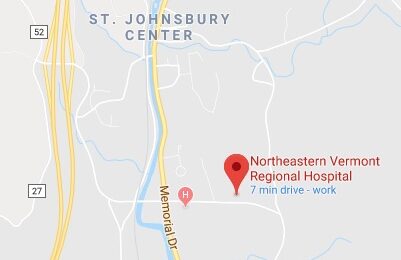Regular Screenings Help Reduce Your Risk of Colorectal Cancer
Colorectal cancer is the second leading cause of cancer-related deaths among both men and women in Vermont and the United States, according to the Vermont Department of Health (VDH) and Centers for Disease Control and Prevention (CDC).
But it doesn’t have to be.
“What I always tell my patients is, no one should have colon cancer,” said Dr. Dana Kraus, Family Physician at the St. Johnsbury Community Health Center & Clinical Lead to Quality at Northern Counties Health Care.
Kraus said almost all colorectal cancers, which are cancers that start in the colon or the rectum, start as a small, precancerous polyp and then grow over time and turn into cancer. This is why colorectal cancer screening can be so effective.
“We should always be finding the cancer before it’s even a cancer, when it’s just a polyp,” Kraus said. “With screening for colorectal cancer you can go in and find those polyps and then get treated by having them taken out before they have a chance to turn into a cancer.”
Kraus said she feels “pretty passionately” that everyone should get screened for colorectal cancer. Why?
“Colorectal cancer screening saved my husband’s life,” she said.
When Kraus’s husband was 42 years old, he went to see his primary care provider for a physical because he noticed there was blood in his stool. His provider recommended he get screened for colorectal cancer.
Kraus said you shouldn’t wait until you start experiencing symptoms to get screened, especially because colorectal cancer doesn’t always cause symptoms. Screening allows polyps to be detected before people begin experiencing symptoms.
Symptoms of colorectal cancer include abdominal pain, a change in bowel habits, unexplained weight loss, and blood in your stool.
“If you wait until you start to experience symptoms to get screened, once [a polyp] becomes a cancer it starts invading the wall of the intestine and that’s when you’d have to have a surgery to take a piece of your colon out,” Kraus said. “If we can find it before it becomes a cancer, it can be treated and the polyps can be removed.”
Kraus said most people should start getting screened for colorectal cancer starting at age 50, as recommended by the U.S. Preventive Services Task Force (USPSTF). The American Cancer Society updated their guidelines for colorectal cancer screening to recommend people at average risk for colorectal cancer begin screening at age 45, which is being
considered by the USPSTF but hasn’t yet been adopted, she said.
For people with a family history of colon cancer, Kraus said it’s recommended to start getting screened when you are 10 years younger than when your family member got it.
“My husband had colon cancer at age 42. My kids are going to have colorectal cancer screenings when they’re in their 30s,” she said.
There are a few tests that can be used to screen for colorectal cancer, according to the CDC. One test is a colonoscopy, which is when a long, thin, flexible tube is used to check for polyps inside the rectum and the entire colon. It’s recommended to get a colonoscopy every 10 years as long as you don’t have an increased risk of colorectal cancer or if the results of your screening come back normal. But, Kraus said, if you have polyps you should have colonoscopies more frequently than every 10 years, because people who have had one polyp are more likely to grow other polyps.
Although a lot of people might have heard stories that preparing for a colonoscopy, which involves emptying the contents of the colon, can be pretty unpleasant, Kraus said most people experience minimal discomfort during or after the
colonoscopy procedure itself.
Other options for screening for colorectal cancer according to the CDC include stool tests, which detect blood in the stool and can be done every one to three years depending on the test; a flexible sigmoidoscopy, which is when a short, thin, flexible tube is used to check for polyps inside the rectum and the lower third of the colon and can be done every five years; or a virtual colonoscopy, which is when X-rays of the entire colon are taken and analyzed and can be done every five years.
A colonoscopy would be used to follow-up on anything unusual found during one of the other screening tests.
Since colorectal cancer screenings are a preventative services, most insurances cover the procedure. You can talk with your primary care provider about which screening option is best for you and how often you should get tested.
We want to hear from you! Are there health topics or issues that you’d like to read about in an upcoming Vital Signs?

Email us your suggestions at vitalsigns@nvrh.org, or mail them to NVRH, c/o Katie Bocchino, P.O. Box 905, St. Johnsbury, VT, 05819.
Sitemap | Privacy Policy | Site developed by Flek, Inc.
Northeastern Vermont Regional Hospital © 2020

